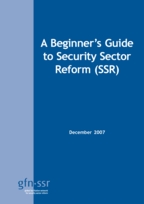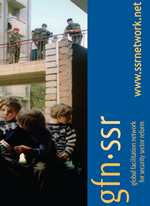 Author: OECD DAC
Author: OECD DAC
Published: 2007
Pages: 255
Electronic size: 1.4 MB
Download full version in pdf format.
The OECD DAC Handbook on SSR: Supporting Security and Justice provides guidance to operationalise the 2005 DAC Guidelines on Security System Reform and Governance and closes the gap between policy and practice. It largely follows the external assistance programme cycle and contains valuable tools to help encourage a dialogue on security and justice issues and to support an SSR process through the assessment, design and implementation phases. It also provides new guidance on monitoring, review and evaluation of SSR programmes, and highlights how to ensure greater coherence across the different actors and departments engaged in SSR.
The Handbook has been developed through a two-year consultative process — it has been designed by and for international actors working to address insecurity and to support access to justice. The process has brought together the development community with their security and diplomatic colleagues to ensure that the handbook incorporates knowledge on the political, governance and technical nature of SSR. It is based on experience gathered from countries that have undertaken security and justice reforms, and the work of the international community in supporting conflict prevention and peacebuilding over the last decade throughout the developing world.
The purpose of the Handbook is to ensure that donor support to SSR programmes is both effective and sustainable. The DAC’s work has provided a platform from which to reach out to non-development actors and to partner countries. In particular, there is growing acknowledgement that the DAC’s governance principles for SSR can help frame the technical inputs provided by diplomatic and security policy communities. This approach provides a framework for supporting countries to address the diverse security and justice needs of their people through greater coordination and integration of development and security policies and practices.
The main policy and operational commitments from this work were endorsed by DAC Ministers and Heads of Agency at the DAC High Level Meeting in April 2007. In endorsing this work, Ministers underlined the need to ensure field level application and greater co-ordination of SSR capacity and activities.
- English Download
- French Download
-
The UK Launch of the OECD DAC Handbook on SSR
26th July 2007
Church House, Westminster, London - For further information, please visit the OECD DAC webpage.
In 2009, OECD DAC launched a new chapter to complement the Handbook: ‘Integrating Gender Awareness and Equality‘. The principal aim of the chapter is to provide guidance for donors and other actors on how to facilitate both an increased gender awareness and female participation in the security system in developing countries. The chapter’s five main sections deal with the most important issues when it comes to gender and SSR. First, it elaborates the benefits of integrating a gender perspective into SSR. Second, it deals with the question of how to conduct gender-responsive SSR assessments. The third and largest section defines potential entry points for development actors and peacekeeping forces. The fourth section deals with cultural obstacles and social challenges. In the last section, the chapter focuses on gender-responsive SSR in post-conflict situations.
- To download the chapter, click here.









